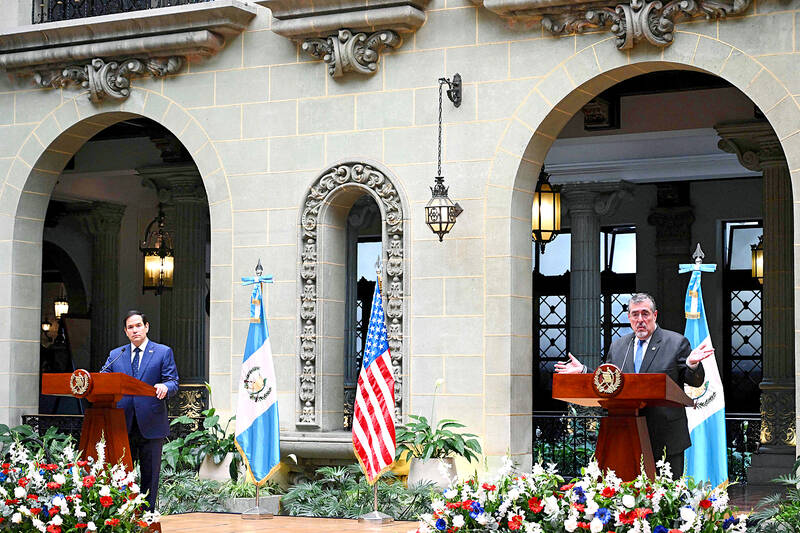Guatemalan President Bernardo Arevalo met with US Secretary of State Marco Rubio in Guatemala City on Wednesday where they signed a deal for Guatemala to accept migrants deported from the US, while Rubio commended Guatemala for its support for Taiwan and said the US would do all it can to facilitate greater Taiwanese investment in Guatemala.
Under the migrant agreement announced by Arevalo, the deportees would be returned to their home countries at US expense. It is the second deportation deal that Rubio has reached during a Central America trip that has been focused mainly on immigration.
Arevalo said his country — a major source of migration — would accept both “returning nationals, and foreigners” who would be sent on to their respective countries.

Photo: AFP
The approach is a stark contrast to Colombia, whose leftist leader demanded “dignified” treatment for deportees and sent planes to repatriate migrants after refusing US military flights with shackled people on board — sparking a brief tariff tussle with Trump.
Arevalo, who has been undermined by an elite that has connections to US conservatives, promised to allow a 40 percent increase in flights repatriating Guatemalans and others from third countries, addressing a key priority for US President Donald Trump.
“We’re not just neighbors. We’re allies — we’re friends — and I think that will be evidenced by the work that we’ve done here,” Rubio told a joint news conference with Arevalo.
He also said the US Army Corps of Engineers would visit Guatemala to help develop plans for a more modern port.
Rubio and Arevalo said they also discussed the value of democracy over a dinner on Tuesday in Guatemala City’s old town.
“I would like to commend you for your commitment to democracy and to institutions,” Rubio said.
Rubio, a longtime hawk on China, said the US would “do all we can to facilitate more Taiwanese investment in the economy of Guatemala.”
“We thank you very much for your support and the relationship that you already have with Taiwan, another democracy,” he said.
“It’s not easy in a world where there is a lot of pressure to change that recognition and to break those ties, but you have always stood firm, and we look for opportunities for that only — not only to be a diplomatic relationship, but for it also to be an economic relationship with investments and opportunities,” he added.
In Taipei yesterday, President William Lai (賴清德) on X expressed gratitude to Arevalo and Rubio for their support for Taiwan.
“Sincere thanks to President Bernardo Arevalo & Secretary of tate Marco Rubio for expressing firm support for the relationship shared by #Taiwan, #Guatemala, & the #US. Our continued joint efforts to bolster trade & investment pave the way for greater prosperity and stronger economic ties,” he wrote.

Conflict with Taiwan could leave China with “massive economic disruption, catastrophic military losses, significant social unrest, and devastating sanctions,” a US think tank said in a report released on Monday. The German Marshall Fund released a report titled If China Attacks Taiwan: The Consequences for China of “Minor Conflict” and “Major War” Scenarios. The report details the “massive” economic, military, social and international costs to China in the event of a minor conflict or major war with Taiwan, estimating that the Chinese People’s Liberation Army (PLA) could sustain losses of more than half of its active-duty ground forces, including 100,000 troops. Understanding Chinese

The Ministry of Foreign Affairs (MOFA) yesterday said it is closely monitoring developments in Venezuela, and would continue to cooperate with democratic allies and work together for regional and global security, stability, and prosperity. The remarks came after the US on Saturday launched a series of airstrikes in Venezuela and kidnapped Venezuelan President Nicolas Maduro, who was later flown to New York along with his wife. The pair face US charges related to drug trafficking and alleged cooperation with gangs designated as terrorist organizations. Maduro has denied the allegations. The ministry said that it is closely monitoring the political and economic situation

UNRELENTING: China attempted cyberattacks on Taiwan’s critical infrastructure 2.63 million times per day last year, up from 1.23 million in 2023, the NSB said China’s cyberarmy has long engaged in cyberattacks against Taiwan’s critical infrastructure, employing diverse and evolving tactics, the National Security Bureau (NSB) said yesterday, adding that cyberattacks on critical energy infrastructure last year increased 10-fold compared with the previous year. The NSB yesterday released a report titled Analysis on China’s Cyber Threats to Taiwan’s Critical Infrastructure in 2025, outlining the number of cyberattacks, major tactics and hacker groups. Taiwan’s national intelligence community identified a large number of cybersecurity incidents last year, the bureau said in a statement. China’s cyberarmy last year launched an average of 2.63 million intrusion attempts per day targeting Taiwan’s critical

AGING: As of last month, people aged 65 or older accounted for 20.06 percent of the total population and the number of couples who got married fell by 18,685 from 2024 Taiwan has surpassed South Korea as the country least willing to have children, with an annual crude birthrate of 4.62 per 1,000 people, Ministry of the Interior data showed yesterday. The nation was previously ranked the second-lowest country in terms of total fertility rate, or the average number of children a woman has in her lifetime. However, South Korea’s fertility rate began to recover from 2023, with total fertility rate rising from 0.72 and estimated to reach 0.82 to 0.85 by last year, and the crude birthrate projected at 6.7 per 1,000 people. Japan’s crude birthrate was projected to fall below six,